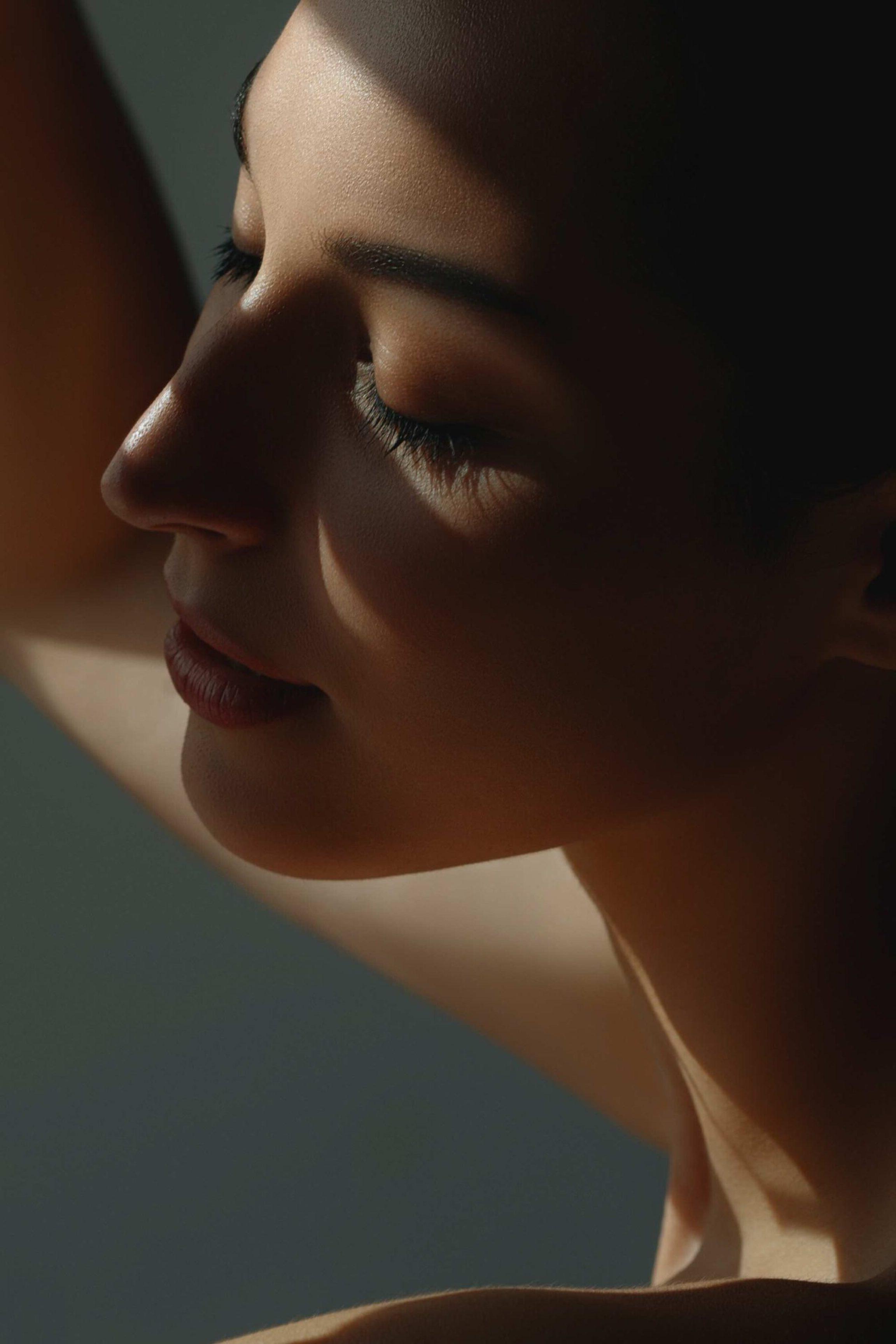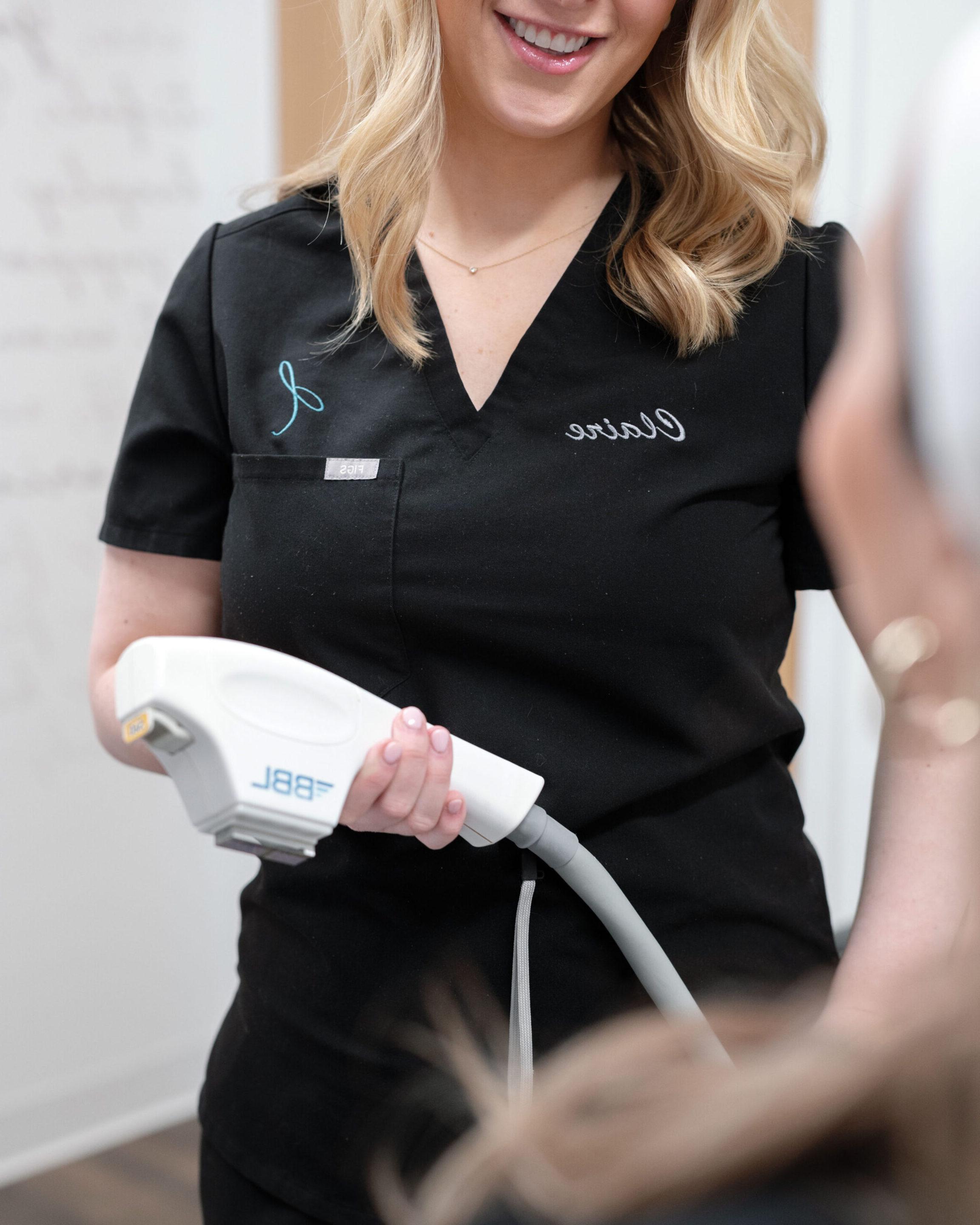Why Fall is the Best Time of Year to Do Laser Treatments
Article was updated on October 14th, 2020 by Dr. Michelle Sieffert

Cooler weather, leaves changing color, pumpkin spice lattes back in your favorite coffee shop — there’s only one explanation. It must be fall! That means it’s time for you to swap your summer T-shirts for some cozy sweaters, and time for us to roll out the lasers.
Yes, we technically have our lasers on hand all year round, but fall is undeniably the best time to use them. For the next few months, we’re going to be ramping up our Halo, BBL and laser hair reduction treatments.
What is “Laser Season”?
You may have heard us refer to “Laser Season” here at Donaldson Plastic Surgery and wondered, “Why is there a specific time of year for laser skin treatments?” Laser season refers to fall and winter, which are the times of year we suggest getting Halo, BBL, and hair reduction procedures.
Using the Sciton laser platform, we have the ability to treat rosacea, broken blood vessels, capillary hemangiomas, small flesh colored moles, some pigmented moles, fine lines and superficial wrinkles, skin dullness and texture, and acne scarring. Over time, the repeated use of lasers also slows the process of aging by improving the collagen content of your skin and causing your cells to act more like they did in youth. If you haven’t met me, I’m a huge advocate of laser skin treatments, and will probably get a laser a year (at least) for the rest of my life. However, there truly are good and bad times to get treated.
Why Fall and Winter Are the Best Seasons for Lasers
Laser treated skin is more sensitive than normal skin, and this increase in sensitivity lasts up to three months after a procedure. This means after any laser you are at higher risk for sunburns, the return and worsening of sun spots, and experiencing a higher intensity of the UV damage that causes skin cancer. As a result, I ask for a 3-month sun hiatus after any laser treatment. This is much more easily done during the fall and winter months when the weather is bad, the sun is further away and often hidden behind clouds, and you’re less likely to be outdoors.
If you’ve been wishing for glowing skin or more time between shaving, this is the time to book. Here are 3 reasons why.
1. You can wipe away summer’s sun damage

Who doesn’t love lounging by the pool, vacationing in tropical places or spending a warm day in the park with their family? Soaking up that warm summer sun always feels good in the moment … but it can take a toll on your skin.
We’re talking UV-induced dark spots, fine lines and wrinkles. The best way to avoid sun damage is to avoid it altogether — applying SPF, wearing a floppy hat and staying indoors during peak sun hours. But even if you did all of that, you likely didn’t escape summer completely unscathed.
Our Halo and BBL laser treatments specifically target the effects of sun damage. So if you got a little too much sun this summer and want to hit the reset button, these lasers are the perfect solution.
2. Lasers and the sun don’t really mix
The other reason fall (and winter, really) is such a great time to undergo laser treatments is that the cooler weather keeps us bundled in our sweaters and jeans or indoors altogether. You see, the sun can cause all kinds of trouble for recently-lasered skin.
During the spring and summer, with the weather in the Midwest is beautiful, it’s sunny more often, and it’s hard to stay indoors and avoid sun! Even if you’re religiously wearing hats and sunscreens, your sun exposure is still higher than during the winter months.
Treatment of tanned or sunburned skin puts you at an increased risk of blistering, while post-treatment sun exposure can leave you with permanent skin discoloration and even worse sun damage than you had before. This is why laser treatments are best scheduled during times of the year when we get less sun.
3. It takes time to get the full results
Lasers aren’t a one-and-done kind of treatment. To get optimal results, you’ll need to undergo a series of treatments and that takes time to do! You don’t want to start laser hair reduction in April and then not have your legs ready for that summer vacation, do you?
Here’s what the timeline looks like:
- Laser hair reduction: A series of six treatments, spaced four to six weeks apart
- Halo: A series of two treatments, spaced six months apart
- BBL: A series of three treatments, spaced four weeks apart
This is just a starting point. Depending on your needs and the results you’re looking for, you could need additional treatments beyond these recommendations. Starting your treatments in the fall and winter gives you plenty of time to complete your series before those coveted warm months return. It’s also a good idea to schedule a maintenance visit every year or so to maintain your results.
I am interested in achieving great outcomes for every person who comes through our office, and once you obtain those outcomes it’s my job to help you maintain them! I would be remiss to let someone get a laser treatment to remove their sun spots, then have those sun spots return with a vengeance shortly thereafter! Therefore, I don’t recommend pursuing laser treatments during spring and summer…I say just wait until laser season!
If you’ve been curious about trying laser treatments, give us a call to set up a consultation. During your appointment, we’ll perform an assessment to ensure that you are a good candidate for the laser you’re interested in and determine your best course of treatment.
About The Author
Dr. Michelle Sieffert is an experienced plastic surgeon in Columbus, Ohio. Beyond her extensive body of work with surgery, she has also researched and adopted a number of non-surgical solutions to help patients become the most confident versions of themselves with less downtime. Dr. Sieffert continues to provide online education for individuals throughout the United States who may be seeking out laser therapy as a possible cosmetic solution.
Related Articles

Read More C-Section Scar Removal
C-Section Scar Removal
When it comes to C-section scars, you have a number of effective solutions to reduce the appearance of scarring.

Read More Best Treatments For Rosacea
Best Treatments For Rosacea
Rosacea can be challenging to manage, but the right aesthetic treatments & lifestyle adjustments can make it possible achieve significant improvements in skin appearance and comfort.

Read More Mole Removal By A Plastic Surgery Practice
Mole Removal By A Plastic Surgery Practice
Choosing a reputable plastic surgery and aesthetics practice for your mole removal procedure improves the chances of a more aesthetically pleasing result.













